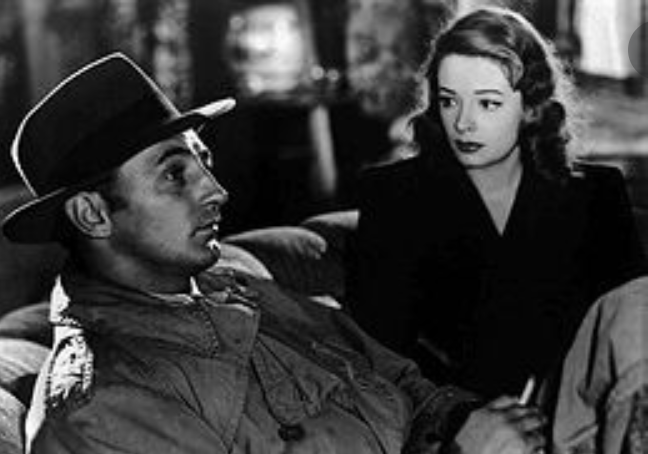
Film Review: Out of the Past (1947)
Kathie: Is there a way to win?
Jeff: Well, there’s a way to lose more slowly.
Every film noir has its unofficial motto: “The stuff dreams are made of” from The Maltese Falcon (1941) or “This is beginning to assume fabulous aspects” from Laura (1944) come to mind. The above exchange between Kathie Moffatt (Jane Greer) and Jeff Markham (Robert Mitchum) sums up Out of the Past, Jacques Tourneur’s 1947 noir classic. In this kind of film, nobody wins. Part of the allure is seeing how characters figure out how to lose more slowly.
The film focuses on Jeff Bailey, an auto mechanic in a sunny nowhere town who can do things like take off work in the middle of the afternoon to go fishing with his girl (Virginia Huston). A man in a black trench coat shows up looking for Jeff, bringing with him the past to which the film’s title refers. On the way to face that past, Jeff tells his girl Ann about his former name—Jeff Markham—and prior vocation—private detective work. A big-time gangster Whit Sterling (played by a young and electric Kirk Douglas) hired Jeff to find his missing girlfriend, Kathie Moffatt. Jeff found her in Mexico but ended up running away with her when the two fell in love. Things went sour when Kathie killed Jeff’s former partner who was threatening to turn the pair into Whit. Now, Kathie has gone back to Whit, and Whit feels it’s time for Jeff to make restitution for his betrayal. In the noir universe, you don’t get mulligans for your mistakes, and Jeff has made a few. The rest of the film plays out Jeff’s attempt to lose as slowly as possible.
Robert Mitchum’s Jeff is one of noir’s best protagonists. He’s got the standard noir traits: he’s a detective who smokes like a chimney, prefers action to yapping, and effortlessly manages to be one of the most interesting men in whatever room he’s in. Plus, he’s sharp, especially in recognizing how much of a chump he can be when a woman’s involved. So, the character works not because Jeff is unique but because he’s the perfect embodiment of film noir’s anti-hero. Mitchum’s physicality puts his cool, laconic style in further relief. He’s the strong, silent type which provides a wonderful contrast to the firebrand energy emanating off of Kirk Douglas here in only his second film.
But the men are only one half of the film’s equation. Leonard Eels, an attorney who also crosses Whit, says, “Women are the 8th wonder of the world, because they all reduce men to the obvious.” In this film that means they reduce men to their names: Sterling (money), Mark-ham (a gull), or even worse an Eel. Given the way the men behave in the film, such treatment is not unwarranted. There isn’t a prominent male character who isn’t in love with a woman beyond reason. Eels falls for his duplicitous secretary Meta Carson. Whit and Jeff both fall for Kathie, a woman who stole $40,000, shot her boyfriend, and killed at least one man. And as for Ann, the innocent country gal who goes fishing with Jeff on lazy afternoons? She’s also being pursued by local law enforcement officer Jim, who says he’s loved since he fixed her roller skates as a boy.
The settings are characters too. Film noir is an urban genre, but Out of the Past makes the rare move of contrasting city and country life, juxtaposing the corruption that comes with the urban environment with the peace and absolution offered by nature. Tourneur opens the film with some glorious panoramic shots of the Western mountains. Tahoe and other bodies of water shimmer against expansive landscapes and endless sky. And this is all in black and white. The film even lends these locales further reality by shooting them on location, providing a stark contrast to the urban scenes that are all shot in dingy interiors, places that seem more phony because they’re more than likely compartments on an RKO set. The problem is that once you go to the city, you can never really leave it, and this movie gives you plenty of reasons to leave it.
There’s some sort of primordial past that keeps calling to Jeff and Kathie, not just the details of their personal histories, but some sort of ur-narrative that lingers over or lies beneath the noir universe. “You’re no good and neither am I. That’s why we deserve each other,” Kathie tells Jeff. We could call it the fall, a sort of intuitive recognition that paradise, somehow and someway, has been lost. Confronted with a bleak world, the best these characters can hope for is to lose more slowly.
The characters may not be good, but the movie is great. Just like the best noirs, you know the inevitable is coming, but oh, what a way to lose!